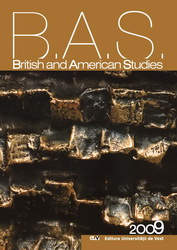POLITE INTERACTION OR COOPERATIVE INTERACTION? BREE’S CONVERSATIONAL STYLE IN ABC’S DESPERATE HOUSEWIVES
POLITE INTERACTION OR COOPERATIVE INTERACTION? BREE’S CONVERSATIONAL STYLE IN ABC’S DESPERATE HOUSEWIVES
Author(s): Daniela Francesca VirdisSubject(s): Language and Literature Studies
Published by: Editura Universităţii de Vest din Timişoara / Diacritic Timisoara
Keywords: conversation analysis; Grice’s cooperative principle and maxims; language and gender; Leech’s politeness principles; stylistics
Summary/Abstract: The paper analyses the character of Bree Van de Kamp, one of the protagonists of the American TV series Desperate Housewives, and some of the conversations in the pilot show in which she participates. In particular, I examine her conversational style, interactional behaviour and politeness and cooperation strategies towards her family and neighbours through the theoretical frameworks of Leech’s Politeness principle and Grice’s Cooperative principle. Linguistic investigation reveals her unbalanced personality. The conversational means she uses not only produce a perlocutionary effect of distance from the other, but also lay bare her traditional ideology and the mainstream female role model she struggles to incarnate: on the one hand she communicates her obsessive compulsion to behave in this way, and on the other hand her psychosis and her loss of contact with reality, two mental states attributable to the impossibility of fully personifying an allegedly perfect female role model.
Journal: B.A.S. British and American Studies
- Issue Year: 2009
- Issue No: 15
- Page Range: 237-251
- Page Count: 15
- Language: English

